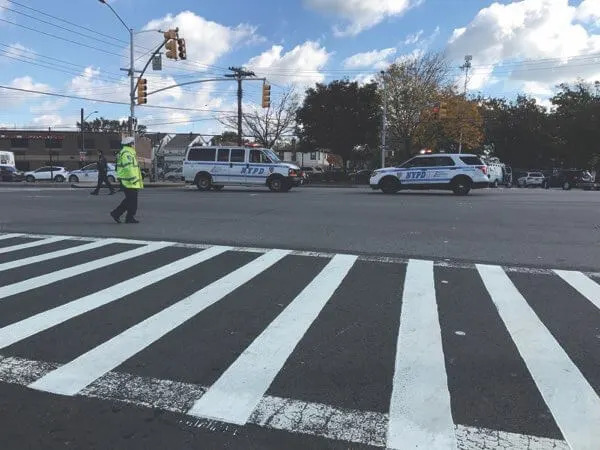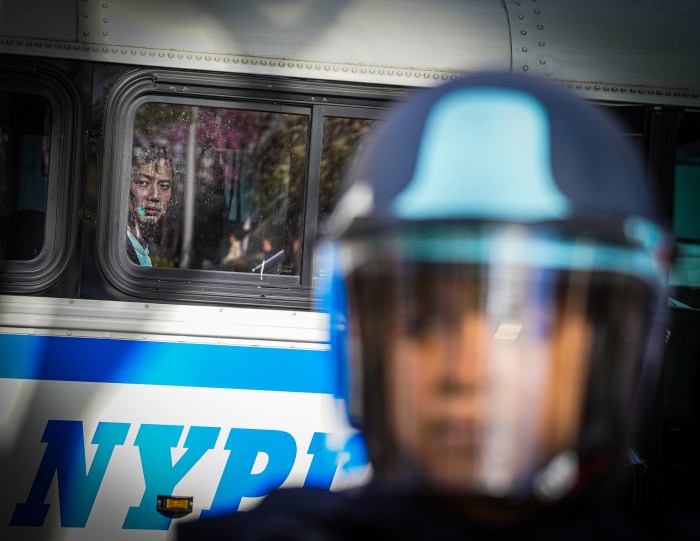By Helen Klein
Local activists are standing firm against the establishment of a medical waste transfer station in Canarsie. During a recent meeting with representatives of the state’s Department of Environmental Conservation (DEC), City Councilmember Charles Barron and the residents in attendance made it clear that, as Barron said, “Under no circumstances are we going to have that in our community. “The community is already suffering from environmental racism,” Barron contended, “with waste transfer stations, bus depots, landfills. We’re not accepting this. It’s an unhealthy situation for a community that has serious health issues.” DEC must issue a permit in order for the facility to open. The company that proposes running it, Citiwaste Medical Waste Disposal, a division of CMW Industries, had previously submitted an incomplete application to the agency. CMW now operates an ambulette service at 100-02 Farragut Road, where it proposes opening the facility. If the plan goes through, Citiwaste, which is a licensed regulated medical waste transporter, would utilize approximately 1,500 square feet within the existing garage area of the building as a regulated medical waste transfer station. This would be the first such facility in Brooklyn. Currently, Citiwaste transports the medical waste it collects to a facility in the Bronx. Under this arrangement, medical waste brought to the property in cargo vans or box trucks would be stored inside a 40-foot tractor trailer container, which would be taken away when filled. The maximum time the tractor trailer container could remain before being removed is seven days, if it is unrefrigerated; refrigerated containers can remain up to 14 days. Citiwaste owner, Gershon Klein, has repeatedly contended that the facility would pose no risk to the surrounding neighborhood. At a public hearing held earlier this year as part of the DEC permitting process, he had said, “It’s not impacting Canarsie. We’re not treating waste. It’s no different than if we had a grocery store and were getting boxes. I don’t believe it’s dangerous. It may be dangerous, but not any more dangerous than Brookdale Hospital.” But, residents believe otherwise. The location, said Mary Ann Sallustro, the president of the South Canarsie Civic Association, is particularly problematic. “It’s not a good spot,” she told this paper. “It’s a dead end street, behind the firehouse. Rockaway Parkway is always backed up. It’s right by the train station, and there are three schools, three group homes and nursing homes nearby. If an accident occurs, what are we being contaminated with? It’s an unknown. “Not one civic is for this,” Sallustro added. In a March 25th letter to the agency, she had urged DEC, “To stop this ill-conceived, unwarranted, dangerous, hazardous, toxic presence and prevent the exploitation and destruction to our quality of life.” Melba Brown, the Democratic district leader of the 58th Assembly District, concurred. Noting that it was “kind of sneaky the way we heard about it in the first place,” Brown said that she believed that the facility, if established, would, “Compromise our area. There are so many senior citizens and people living in group homes just around that area. God forbid an accident were to occur, that’s not the best place for it.” There are also homes just a short distance away, as well as a facility where chicken is handled, said Brown. “So, anything we can do, we will be doing,” she went on. “I have been encouraging people to submit letters to DEC, not only to tell them that we don’t want it but to give them reasons. Unless we band together, we can’t really fight.” At this point, DEC has taken no position on the application, according to agency Spokesperson Arturo Garcia-Costas. Garcia-Costas said that, as of now, “The application is under review and is currently incomplete. DEC has no position on the permit application at this time. Our purpose in meeting with the concerned community members was to explain our public decision-making process so that they could participate in that process to the fullest extent possible. “When the application on the project is complete,” Garcia-Costa added, “DEC will issue a public notice and invitation for comments. DEC invited community members to put their specific concerns in writing to facilitate their full consideration during the application process. DEC also informed them that they could request a public hearing.” Indeed, civic leaders are not biding their time. “We’re going to push ahead, mobilizing and organizing the community,” promised Barron. While, he said, it may not be necessary – if DEC listens to the community’s concerns – it is important, Barron stressed, that the community not be taken by surprise should DEC decide to give the facility a green light. “The struggle continues,” he told this paper.































